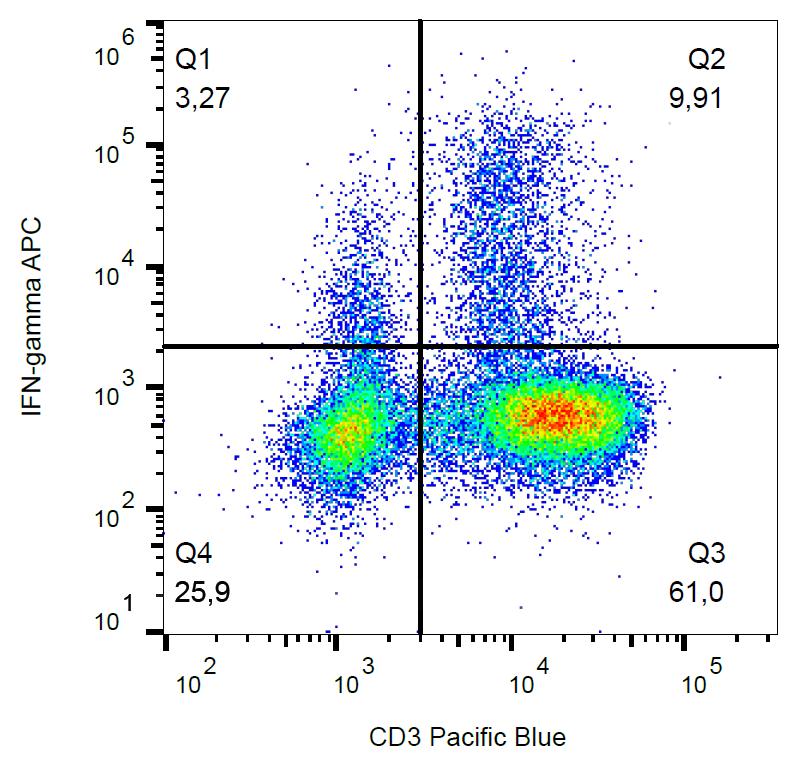Interferon gamma (IFNG) Mouse Monoclonal Antibody [Clone ID: 4S.B3]
CAT#: AM26712AC-N
Interferon gamma (IFNG) mouse monoclonal antibody, clone 4S.B3, APC
Conjugation: Unconjugated Biotin FITC PE
Specifications
| Product Data | |
| Clone Name | 4S.B3 |
| Applications | FC |
| Recommended Dilution | Flow Cytometry analysis of human blood cells using 10 μl reagent / 100 μl of whole blood or 106 cells in a suspension. The content of a vial (1 ml) is sufficient for 100 tests. The content of a vial (1 ml) is sufficient for 100 tests. |
| Reactivities | Human, Primate |
| Host | Mouse |
| Isotype | IgG1 |
| Clonality | Monoclonal |
| Immunogen | Interferon gamma derived from human leukocytes |
| Specificity | This antibody recognizes IFN-gamma, a 16-25 kDa cytokine produced by activated Th1 cells and NK cells. Binds both glycosylated and non-glycosylated protein. |
| Formulation | Phosphate buffered saline (PBS) Label: APC State: Liquid Ig fraction Preservative: 15 mM sodium azide Label: Conjugated with cross-linked Allophycocyanin (APC) under optimum conditions. The conjugate is purified by size-exclusion chromatography and adjusted for direct use. |
| Conjugation | APC |
| Storage | Store the antibody undiluted at 2-8°C. DO NOT FREEZE! This product is photosensitive and should be protected from light. |
| Stability | Shelf life: one year from despatch. |
| Gene Name | interferon, gamma |
| Database Link | |
| Background | The Interferon gamma (IFN-gamma; 16-25 kDa) is an important regulator of the immune response, produced in activated Th1 cells and NK cells, particularly in response to IL-2, TNF-alpha and IL-12; its production is suppressed by IL-4, IL-10, and TGF-beta. The producing of IFN-gamma is activated by specific antigens or mitogens through the T cell antigen receptor. IFN-gamma polypeptide forms: 40-60 kDa forms are observable under non-denaturing conditions as dimers and trimers; 20 kDa and 25 kDa forms exist due to variable glycosylation. IFN-gamma belongs to the type II interferons, also called immune IFN. IFN-gamma shows antiviral activity and has important immunoregulatory functions. It is a potent activator of macrophages and had antiproliferative effects on transformed cells. IFN-gamma plays an important role in regulating B cell differentiation by simultaneously stimulating class switch recombination to the IgG3 and IgG2a isotypes while represing class switch recombination to the IgE and IgG1 isotypes. It also appears to promote antigen presentation by B cells through its effects on MHC. Binding of IFN-gamma to its receptor increases the expression of class I MHC on all somatic cells. It also enhances the expression of class II MHC on antigen-presenting cells. IFN-gamma is the major means by which T cells activate macrophages, increasing their ability to kill bacteria, parasites, and tumours. The activation of macrophages by IFN-gamma is essential for the elimination of bacteria that replicate within the phagosomes of macrophages (f.e. Mycobacteria and Listeria monocytogenes). IFN-gamma can potentiate the high antiviral and antitumor effects of the type I interferons (IFN-alpha, IFN-beta). IFN-gamma may also activate neutrophils and NK cells. |
| Synonyms | IFN-gamma, gamma IFN |
| Reference Data | |
Documents
| Product Manuals |
| FAQs |
| SDS |
{0} Product Review(s)
Be the first one to submit a review






























































































































































































































































 Germany
Germany
 Japan
Japan
 United Kingdom
United Kingdom
 China
China



